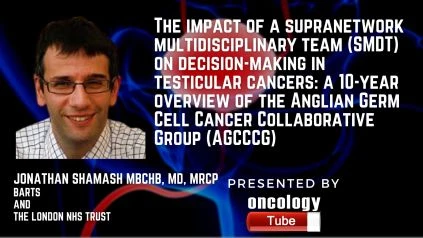Jonathan Shamash MBChB, MD, MRCP of Barts and The London NHS Trust speaks about The impact of a supranetwork multidisciplinary team (SMDT) on decision-making in testicular cancers: a 10-year overview of the Anglian Germ Cell Cancer Collaborative Group (AGCCCG).
Instract
Context
For the Anglian Network, the germ cell supranetwork multidisciplinary team (SMDT) serves a population of 7.5 million.
Methodology
We analyzed and classified 10 years of SMDT discussion into five domains ((1) overall result, (2) untreated disease and salvage therapy chemotherapy regimens, (3) radiology, (4) pathology, and (5) complex cases) to determine the effects of SMDT.
Outcomes
There were a total of 2892 new cases reviewed. In the first 5 years, low-volume vs. high-volume centers had worse survival in patients with a strong prognosis of the disease (87.8 vs 95.3, p = 0.02), but the disparity was no longer important in the last 5 years (93.3 vs 95.1, p = 0.30). The radiology examination of 3206 scans resulted in the rejection of the progression diagnosis in 26 cases, with a further 10 cases down-stage. Two specialist uropathologists had 790 pathology reviews, leading to improvements in 75 cases. During this time span, 18F-fluorodeoxyglucose (18FDG) PET-CT was performed but did not help to predict who will have viable cancer. It addressed a total of 26 patients with serious mental health conditions who were unable to give informed consent.
Completion
Working with SMDT has contributed to improved results and refined treatment of patients with germ cell tumors.

